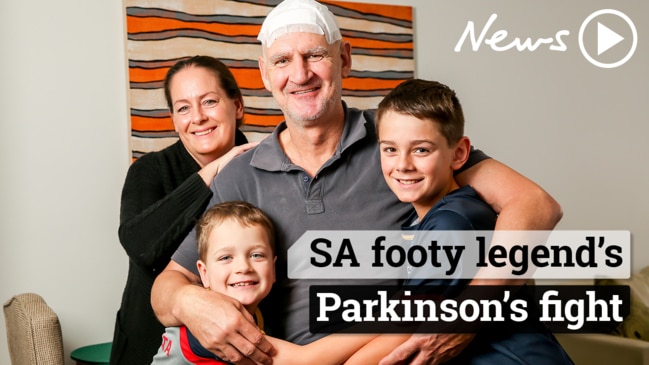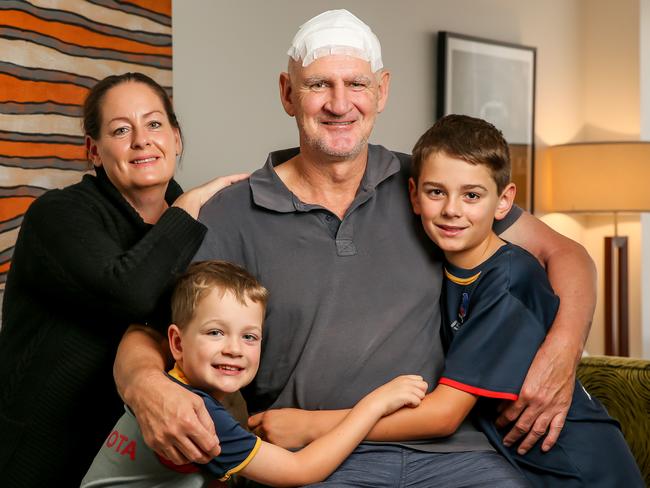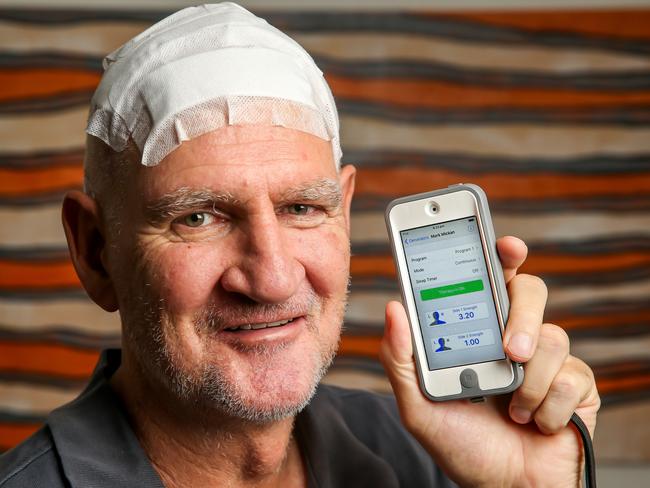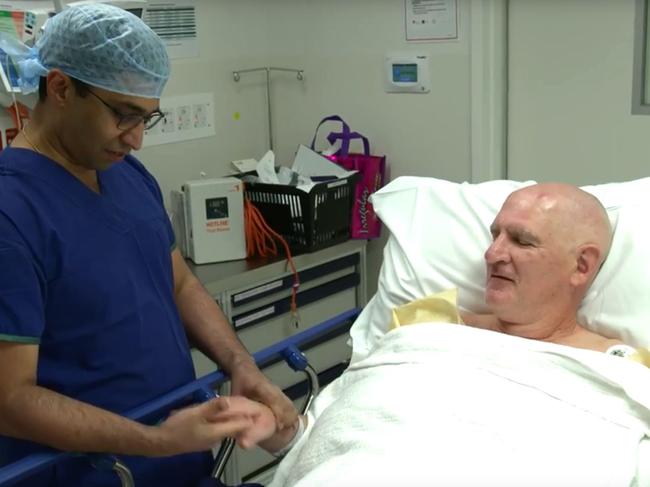Mark Mickan’s second chance after revolutionary implant surgery to slow Parkinson’s
As a footballer, Mark Mickan never took a backward step. Now, battling Parkinson’s disease, his fighting spirit has led him to a revolutionary new treatment.

SA News
Don't miss out on the headlines from SA News. Followed categories will be added to My News.
As a footballer, Mark Mickan never took a backward step. The Riverland-born ruckman, who played for Adelaide and Brisbane, unflinchingly faced all opponents.
So when the father-of-two was diagnosed with Parkinson’s disease in 2016, few were surprised when he faced it head on.
Now Mickan, 58, is among a group of Australians to undergo groundbreaking treatment for the insidious disease — treatment that has already produced remarkable results and looks likely to radically improve his quality of life.
The respected footballer — who played 139 games for West Adelaide, 48 games for the Brisbane Bears and 37 games for the Crows before coaching Woodville-West Torrens, Glenelg and West Adelaide — has had Abbott’s Infinity DBS System implanted directly into his brain.
The device delivers electrical impulses to relieve the tremors that are the most obvious, and often most debilitating, symptom of the disease. While deep-brain stimulation has been used on Parkinson’s patients for more than two decades, the Infinity DBS system differs in that the amount of electrical impulse can be controlled by the doctor, and to a lesser extent the patient, to ensure that the best outcome is achieved.
The other benefit is that, unlike standard DBS operations, the patient does not have to be awake during the procedure.
For Mickan, who was suffering severe tremors in one hand and both feet, Monday’s operation has been an overwhelming success.
The tremors in his feet have almost ceased, and his hand tremor has improved markedly. Neurologist Dr Andrew Evans said Mickan could expect further improvement as they worked together to get the amount of brain stimulation just right.

It was in August 2016 that Mickan finally decided to see his doctor about two issues that had been vexing him — a bout of what he suspected was depression and a slight tremor in his right hand. His GP confirmed that Mickan was indeed depressed, and referred him to a neurologist for the tremor.
It was in the neurologist’s office that life as Mickan had known it to that point would change forever.
“I was coaching West Adelaide at the time,” he says. “The neurologist put me through a pretty basic test where you have to move your fingers, go for a walk, that type of thing.
“I actually thought that I’d done pretty well, but the doctor said they thought there was an 80 per cent chance I had Parkinson’s disease.”
Mickan clearly remembers calling his wife, Callie, from the surgery carpark to tell her of the diagnosis.
“She was as shocked as I was,” he says.
The couple originally decided to spare their boys — Fletcher, 11, and Spencer, 7 — from the details of the disease, but as the tremors progressed it soon became apparent that there was something wrong with dad.
Mickan says he first heard of the concept of deep-brain stimulation through a mate who had suffered a brain injury, and he was immediately keen to find out more.
Melbourne neurologist Dr Andrew Evans met with Mickan and determined that he would be a good candidate for the new-generation DBS device.
Last Saturday, Mickan went into surgery for the operation, led by neurosurgeon Dr Girish Nair.
Before the device, the tremors in Mickan’s feet were so severe that he was often forced to walk in a shuffle, and the severe shake in his right hand made performing even simple tasks difficult.
Post-surgery, the tremors in Mickan’s feet have almost disappeared and his hand tremor has reduced markedly and will likely improve more as the amount of electrical impulse administered to his brain is finetuned.
The Infinity DBS system is controlled via Bluetooth using an over-the-counter iPod. Dr Evans sets the main level of stimulation, while Mickan can make fine adjustments with his own device.

“My feet have basically stopped their tremors, which means I can walk much better,” Mickan says.
“My hand is still a work in progress — it still has the occasional tremor — but that’s something we can work on. We hope to get that under control over the next few weeks.
“I feel very grateful for the opportunity, and I must say that the AFL Players Association have been fantastic in the way that they’ve supported me through this.
“They’ve enabled me to afford this procedure, and without them I probably wouldn’t have been able to have the operation when I did.”
Mickan admits that he still has plenty of daily challenges — everything from the loss of his sense of smell to dizziness — but getting the tremors under control was the first step to getting something that resembles his old life back.
He plans to go back to a coaching role with the St Michael’s College First XVIII, a job he loved but had to quit when his tremor made even writing on a whiteboard impossible. “I’m just looking forward to getting back to doing things that I used to be able to do,” he says.
“Even just playing with my kids, being able to hit a ball, catch a ball, have a kick without booting it over the fence.
“It doesn’t cure Parkinson’s but it can give me a life that I wouldn’t have otherwise had.”

For Dr Evans, Mickan’s operation couldn’t have gone any better.
He says a CT machine was used to ensure that the device was implanted in exactly the right part of Mickan’s brain, and the results have been instantaneous.
“I’m delighted actually,” the neurologist says. “It’s gone very smoothly.”
Dr Evans says he was aware of Mickan’s career as an AFL footballer, and was connected with him through another high-profile player who was also a patient.
“Mark initially contacted me through email, and then Parkinson’s SA steered him in my direction,” he says.
“When I first saw Mark I knew that he was going to be, in all likelihood, a very good candidate.”
Dr Evans says that Mickan’s tremor didn’t respond to medication, meaning that the Infinity DBS system was the only thing likely to improve his quality of life.
“We know that DBS can be effective where the medication hasn’t been,” he says. “You can turn it on and get a really good tremor-suppression effect where medication hasn’t worked.”
Dr Evans says the fact that the patient was under a general anaesthetic, as opposed to a light sedation in the traditional DBS implantation, was a huge leap forward for patient wellbeing.
“Staying awake during these procedures is very challenging,” he says.
“Often, if you don’t get the electrode in exactly the right spot and you have to go back and change it, people tell you that they don’t think I can go through it again.
“They’re effectively listening to the surgeon drill through the skull … it can be really distressing.” Dr Evans says the implantation of the Infinity DBS System had resulted in about a 70 per cent reduction in Mickan’s tremors, and further improvement could be expected as they experimented with the electrical impulses using the device’s iPod controllers.
“It’s a bit weird, even to me, to think that, in some respects, I’m controlling elements of someone’s functioning behaviour via Bluetooth,” he says.
“With the traditional device, you used to have to hold an antenna right up against the chest wall, which isn’t ideal if you’re trying to observe something like how a patient is walking.
“I have to learn how he responds to the stimulation. I have eight electrodes on either side of the brain that I’m able to turn off and on, up and down in various combinations. I’m looking at targeting the best area of the brain to target the tremors and the stiffness and the slowness.
“Once I’ve done that, there is a range within which Mark can modify the setting. He can turn things up and down to fully optimise the effect.”
Dr Evans says it’s important to point out that tremors are not the only debilitating aspect of Parkinson’s disease, and that DBS wasn’t suitable for everyone.
“In some cases, like Mark’s, the tremor starts to become a major part of the problem, particularly in social situations or high-pressure situations or stressful situations,” he says.
“In those situations the tremor can become quite violent. This can mean that people become socially and occupationally isolated just from the tremor itself.
“Everybody has their own journey and combination of symptoms, and some symptoms will respond well to DBS and some don’t.
“Approximately one in 20 people with Parkinson’s will have the sort of symptoms that will respond to a significant degree, and up to one in ten will get a response.
“Mark’s in that good group because of his particular symptoms.”



